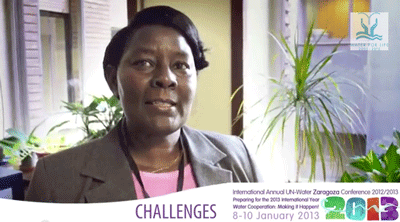- ON THE DECADE
- THE DECADE'S CAMPAIGN
- REPORTING ON PROGRESS
- THE DECADE'S PROGRAMMES
- FOCUS AREAS
-
- Access to sanitation
- Financing water
- Gender and water
- Human right to water
- Integrated Water Resources Management
- Transboundary waters
- Water and cities
- Water and energy
- Water and food security
- Water and sustainable development
- Water and the green economy
- Water cooperation
- Water quality
- Water scarcity
- FOCUS REGIONS
- RESOURCES FOR
- UN e-RESOURCES
International Annual UN-Water Zaragoza Conference 2012/2013
Preparing for the 2013 International Year. Water Cooperation: Making it Happen! 8-10 January 2013
Mount Kenya East Pilot Project for Natural Resource Management, Kenya
 Interview with Faith Muthoni Livingstone. Project Manager, Mt. Kenya East Pilot Project
Interview with Faith Muthoni Livingstone. Project Manager, Mt. Kenya East Pilot Project
Mount Kenya is one of the five water towers in Kenya whose water yield contributes close to 49% of the flow of Tana River (the biggest river in Kenya). The river supports close to 50% of the hydropower generated in Kenya; irrigated agriculture; fisheries; livestock production and biodiversity conservation in the lower Tana basin and is thus strategic to Kenya's economic development. These functions were increasingly threatened by environmental degradation in the upper and middle catchment of the river. Deforestation, inappropriate land use practices and overgrazing triggered soil erosion which contributed to a high sediment load to the river, its tributaries and the hydroelectric power dams. Increased cultivation reduced the ability of the land to hold rainwater, causing fluctuation in river regime during the rainy season and depressed base flows in the dry season, thereby impairing water supply. Ultimately, the allocation of water resources became a sensitive issue which could potentially trigger ethnic tension and conflicts.
To reverse this vicious degradation cycle, the Government of Kenya initiated the Mt. Kenya East Pilot Project for Natural Resources Management Project (MKEPP). The International Fund for Agricultural Development (IFAD) and Global Environmental Facility (GEF) were approached for assistance in project financing. The overall goal of the project is to reduce poverty through improved food security and improving levels of income of farmers - particularly rural women. MKEPP-NRM focuses on the effective use of natural resources, improving access to water and introducing better farming and water management practices for sustainable use of land and water resources. It has supported community-based water resources management and the formation of Water User Associations (WUAs), River User Associations (RUAs) and Catchment Area Advisory Committees (CAACs). The project was implemented between 2004 and 2012.
>> Organizers
>> Key questions
>> Expected outcomes
>> Agenda
>> Participants
>> International Year and WWD 2013
>> UN initiatives on water cooperation
>> UN Water Convention
>> UN Watercourses Convention
>> Challenges for water cooperation
>> Addressing cooperation: tools and mechanisms
>> Mediation and dispute resolution mechanisms
>> Alternative Dispute Resolution Approaches
>> Water cooperation: nations and stakeholders
>> Water cooperation in rural areas
>> Water cooperation in cities
>> Interview questions for case study presenters
>> World Water Day 2013
>> World Water Week 2013
>> The UN Global Compact
>> Intensively developed aquifers
>> Stakeholders platforms in Spain
>> Field visits
>> Cases on water cooperation
>> Conference daily
>> Conference flyer
>> Conference interviews
>> Conference poster
>> Information briefs
>> Presentations from participants
>> UN water cooperation reports
>> Video interviews with participants
>> Video recording of sessions
>> Water cooperation in the media
>> Web banners
Copyright | Terms of use | Privacy notice | Site Index | Fraud alert | Help




